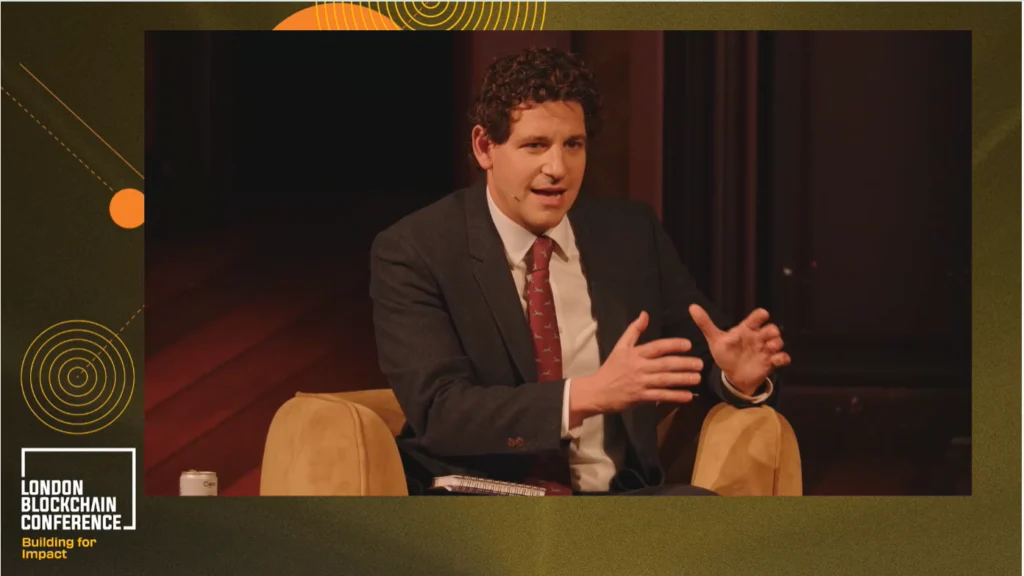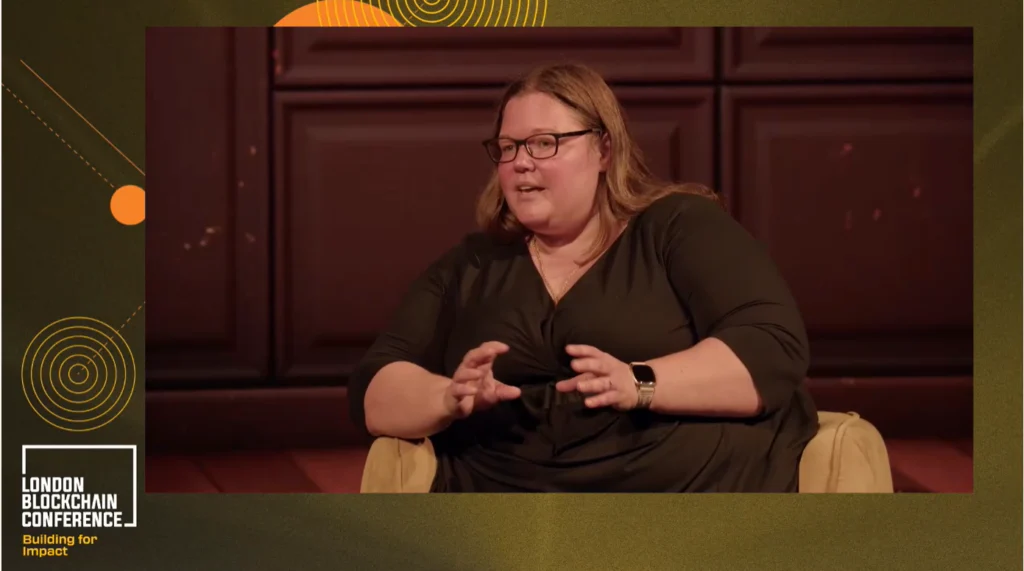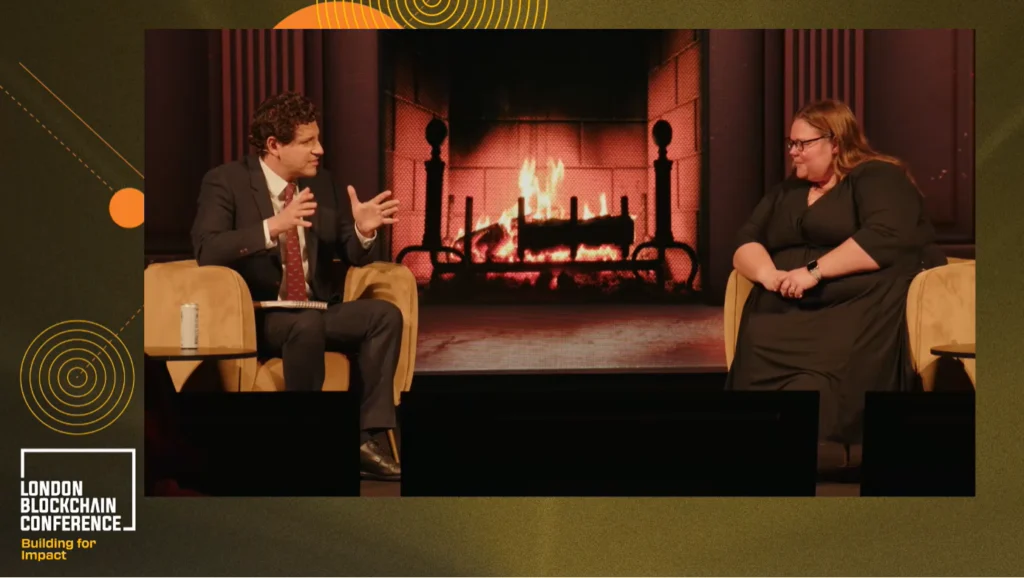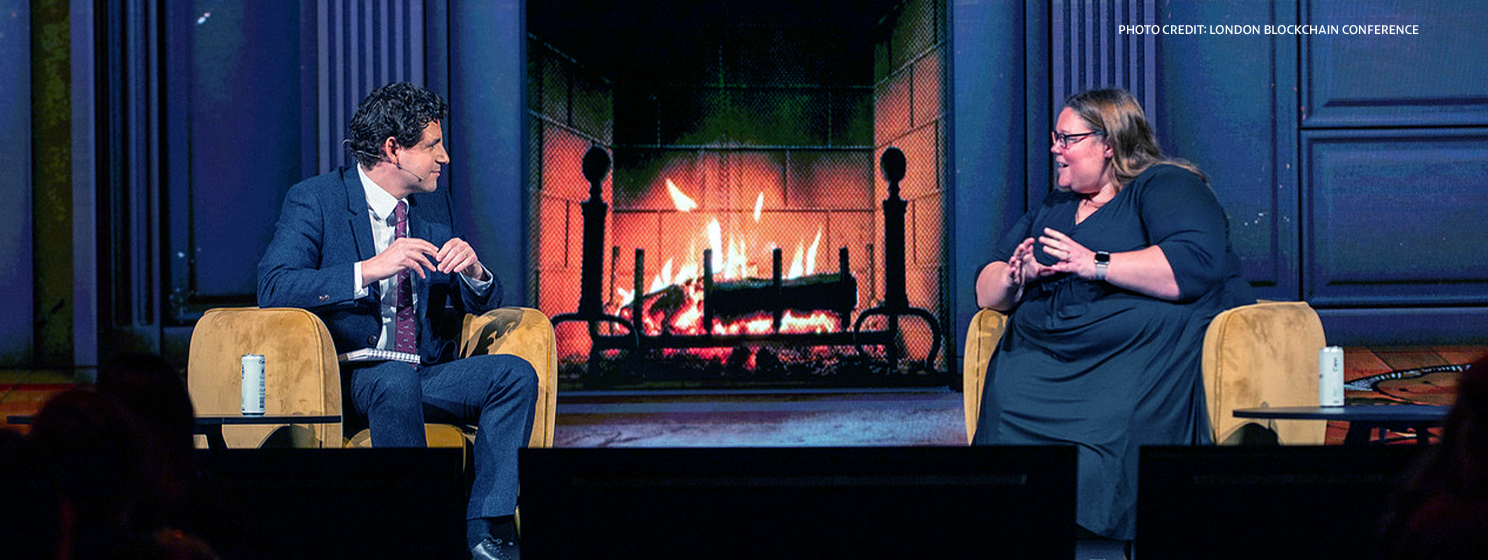|
Getting your Trinity Audio player ready...
|
The United Kingdom’s top blockchain-focused financial regulator wants you to know that not only is she not evil, but she also wants to work with digital asset firms to help them safely deliver great products to the consumer.
The first day of the London Blockchain Conference 2025 was a comprehensive affair, with representatives from the worlds of digital assets, artificial intelligence (AI), banking, and government coming together for some lively debate and informative discussion.
One of the more interesting discussions saw BBC News reporter Mark Lobel conduct a ‘fireside chat’ (the fireplace was, appropriately enough, a digital one) with Jane Moore, Head of Department, Payments and Digital Assets at the U.K.’s Financial Conduct Authority (FCA).

In recent years, the FCA has come under fire for what some consider to be an overly cautious approach to regulating digital assets. Right or wrong, that perception has increased following United States President Donald Trump’s return to the White House and the FCA’s American counterparts loosening (and in some cases eliminating entirely) regulatory constraints on all things ‘crypto’ faster than many believed possible.
But the FCA’s mandate includes a responsibility to protect consumers, as well as the integrity of the overall U.K. financial system. And even the most rabid crypto bro would acknowledge that there are elements of this sector that the U.K. population has sometimes required protection from.
To its credit, the FCA recently relaxed its longstanding prohibition on retail customers purchasing exchange-traded notes (ETN) based on digital assets. The FCA has also voiced its support for tokenizing assets (both real-world and digital) and issued a comprehensive ‘crypto roadmap’ detailing its long-term plans to consult with stakeholders on a wide swath of sector-specific regulatory policies.
With all that as a backdrop, Lobel sat down with Moore to get her personal and professional takes on how the FCA is doing its job and what digital asset operators can do to work with the regulator to achieve mutually acceptable goals.
The chat
If you’re ever wondering how someone becomes a regulator, in Moore’s case, she was working in commercial law but ultimately concluded that “it was far more interesting to make the law than to interpret it.”
Moore said she finds the digital asset sector “fascinating,” in part because it’s a new industry with “so much potential.” That said, “regulation needs to play its part to make [crypto] work.”
Asked if there was one myth about the FCA she’d like to rebut, Moore said: “Regulation isn’t easy … We’re not trying to stop growth, we’re not trying to stifle ideas, we’re trying to make them better and safer.”
“Regulation is key to developing “a competitive and sustainable crypto industry … It’s key to making sure that consumer protection is in place, that there’s market integrity, that firms operate at the right standard,” she added.
As for the FCA’s methodology, Moore sees “so many parallels to traditional finance (TradFi), to existing regulation. So we take regulation that’s currently in place, look at what works, what doesn’t work, and propose something that works for crypto, looking at the nuances for crypto and its special features, so that we can develop a regime that delivers what it needs to deliver, delivers consumer protection, delivers market integrity, but also allows for innovation. And those are balances and there’s trade-offs in that.”
Asked what ‘green flags’ help inform Moore that a product is putting users first, she cited “actual consideration of the user at the start … we have the Consumer Duty and one element of that is that there are good outcomes for retail consumers … So what are you trying to deliver? What are the risks of your products? How do you mitigate those risks? And if you think that through at the start, that puts you in really good stead to come to us and test the innovative bits of it.”
Lobel asked for a show of hands to see how many members of the audience had ever sat in a room with Moore or her equivalent, or done so over the phone. He estimated that only about 10% of the room answered ‘yes’ to either question, a low number that puzzled Moore.

“I like to get new ideas, I like to talk to industry … I find that having lots of different opinions gets us to a better place … I need the feedback from [digital asset operators] as to whether it works and what doesn’t work. And when things don’t work, I need solutions … I like to learn something in everything that I do. So I like people to come to me and say that doesn’t work, but this is something that could work.”
“I’ve spoken to hundreds of different firms, hundreds of different people around the world … what really works for me is where I have conversations at the start of the policymaking process, so that we can really take into account what’s happening, what new innovations are coming … because being alone in a room is not going to get us good policy. Talking is going to get us good policy.”
Moore explained that she was talking primarily about policy because that was her brief. But the FCA also has “some fabulous people in innovation who go out there and talk to people. And we’ve got, I think, three different regulatory sandboxes where we invite firms in to test ideas … I get so much good information from that because ideas are being tested, things are going right, things are going wrong. And I can take that into the policy development to actually understand what’s right and what’s needed in rules.”
Moore noted that, in the first five months of 2025, the FCA had received 105 sandbox applications, of which 22 were in regard to payments and digital assets.
“That’s a whole heap of good ideas, a whole heap of potential … and I want to make regulation work for them,” she said.
It’s good to talk
Asked what initial steps entrepreneurs and entities should take to engage constructively with the FCA, Moore said, “come talk to us. Come talk to our innovation services, come talk to our authorization colleagues…there are lots of services that we have available to help…there’s a pre-application service run by our authorization colleagues, and that will give you more information to help you make a successful application to the FCA.”
Asked how firms should prepare for a meeting with Moore, she said, “know what you want to achieve from the meeting and tell us.” However, Moore cautioned that “there are high standards that we expect of firms, there are all sorts of requirements that we do expect firms to meet, and it’s worth being aware of the breadth of the regulatory requirements.”

Regarding the latter, Moore referenced the money laundering/terrorist financing regulations (that are being updated as we speak). There are also relatively new requirements regarding the financial promotions (FinProm) regime for anyone advertising or marketing crypto in the UK.
Moore noted that the FCA was guided in part by “international principles” set by the likes of the Financial Stability Board (FSB), the Financial Action Task Force (FATF), and the International Organization of Securities Commissions (IOSC). She added that “there is a baseline of regulation around the world” and the FCA’s goal is to ensure “our regulation fits into that. Otherwise, there’s all sorts of risks coming from a fragmented regulatory regime around the world.”
Moore offered a recent example of this international collaboration, in which “my supervision colleagues received a call from a different regulator who said there’s something fishy going on, there was some criminality. The U.K. supervisors looked at the blockchain, engaged with the firms, did their supervision thing, and actually stopped the problem. Without that international element of being told that there was a problem, we wouldn’t have seen it quite so early, and people would have been harmed from it.”
Lobel used this opportunity to reference the Transatlantic Taskforce, a U.S.-U.K. initiative intended to ‘enhance collaboration on capital markets and digital assets and other innovative financial activities.’ Announced in September, the Taskforce has given itself 180 days to deliver its initial findings.
Moore said the FCA was considering “what ideas we can come up with to develop that relationship and make sure that there is cooperation, that there is collaboration,” but stopped short of offering specifics.
However, Moore expressed approval of Trump signing the stablecoin-focused GENIUS Act into law this July, saying “there’s so much potential for stablecoins in the future as they develop.” Moore went on to project that stablecoins would be the area of UK digital asset policy that would move fastest over the next 12 months.
In closing, Lobel asked Moore to offer one reason why people should have optimism regarding wider digital asset adoption. Moore turned to the audience and said, “because you’re all here. Because there’s so much engagement…I think crypto is here, it’s here to stay, and I hope regulation helps that.”
Watch: Breaking down solutions to blockchain regulation hurdles
Recommended for you
British lawmakers of the parliamentary national security committee have called for a temporary ban on political parties receiving donations in
Circle (NASDAQ: CRCL) soared in 2025 thanks to U.S. ‘regulatory clarity,’ but can this momentum survive a ban on crypto

 02-26-2026
02-26-2026 




